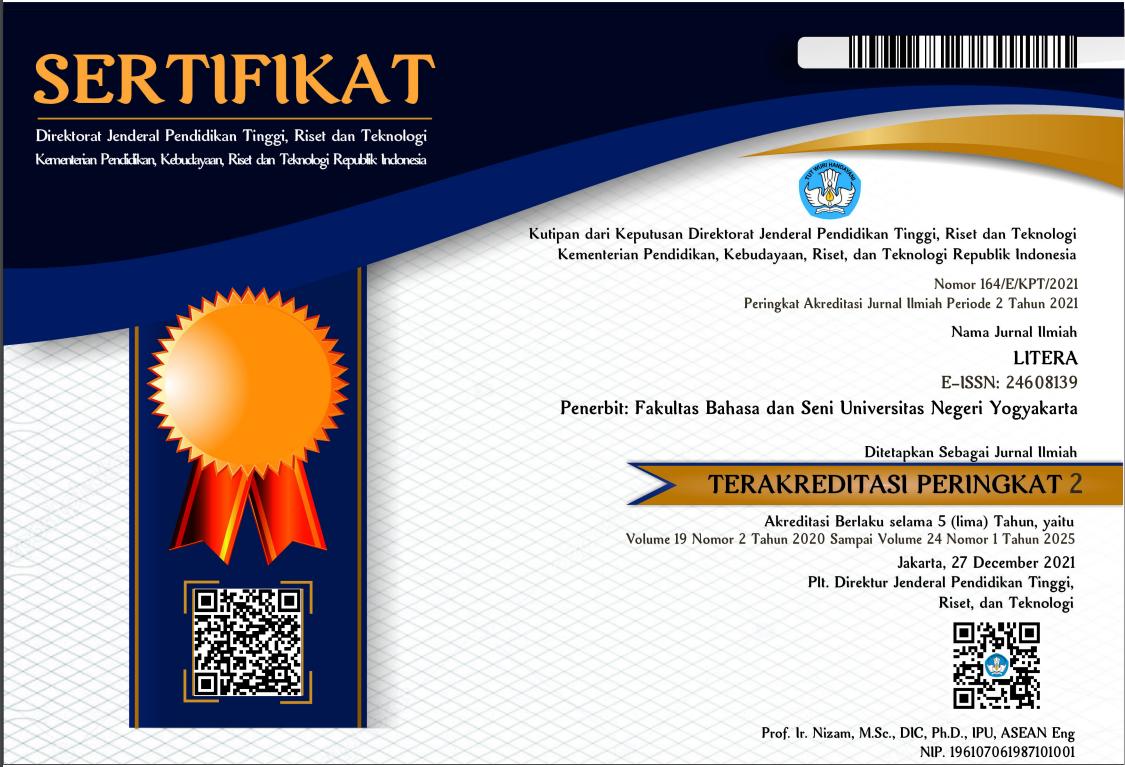ASPEK KE-SOEHARTO-AN DALAM KUMPULAN CERPEN SOEHARTO DALAM CERPEN INDONESIA
Vol. 4 No. 1: LITERA JANUARI 2005
Articles
Downloads
and (2) ways of expressing those aspects in the anthology of short stories entitled
Suharto claim Cerpen Indonesia.
The source of the research data was Soeharto dalam cerpen Indonesia (2001), an
anthology of short stories edited by M. Shoim Anwar. All of the short stories (17)
were selected. The data were collected through reading and recording techniques and
were analyzed by the descriptive qualitative technique involving data comparison,
categorization, tabulation, and inference. Data trustworthiness was assessed through
the semantic and referential validities and data consistency through the intrarater
technique.
Research findings show that 15 short stories clearly contain Soeharto-related
aspects, and two short stories do not reveal these aspects clearly. Soeharto-related
aspects are shown through: (1) personification in the form of physical appearance,
character, verbal and nonverbal behaviors, (ii) governance and economic strategies,
(iii) society's condition and attitude under his reign, approaching his fall and after his
fall, (iv) spatial and temporal settings related to his reign, (v) the party functioning as
his power apparatus, and (vi) government officials' life style and attitude. In general
the short stories do not mention Soeharto directly, but only through certain aspects
or symbols easily identified as Soeharto's characteristics. Soeharto-related aspects
are expressed through various ways, such as parody, irony, cynicism, and dialectics.
The expressions through particular characters parodying Soeharto are the most
apparent, simultaneously using irony and cynicism. The expressions through irony
are the most dominant in the short stories, and in this way the criticisms sound more
subtle and "polite". This is different from cynicism, which criticizes and defames
ones in a vulgar manner. This is a reflection of control imposed on the writers in the
past, who now feel free to express anything without any fear of being arrested. The
expressions through dialectics are made more intellectually and invite readers to
think.
Key words: Soeharto-related aspects, personification, parody, irony, cynicism,
dialectics
Nurgiyantoro, B. (2005). ASPEK KE-SOEHARTO-AN DALAM KUMPULAN CERPEN SOEHARTO DALAM CERPEN INDONESIA. LITERA, 4(1). https://doi.org/10.21831/ltr.v4i01.4882
Downloads
Download data is not yet available.
























